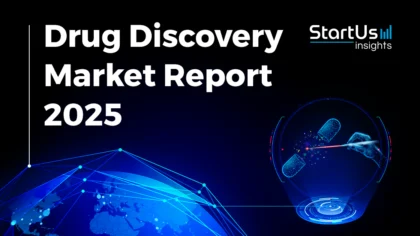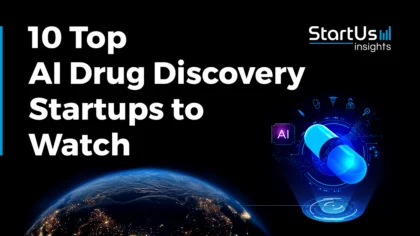Staying ahead of the technology curve means strengthening your competitive advantage. That is why we give you data-driven innovation insights into the pharma industry. This time, you get to discover 5 hand-picked startups developing exosome-based solutions.
Global Startup Heat Map highlights 5 Top Exosome-based Solutions out of 87
The insights of this data-driven analysis are derived from the Big Data & Artificial Intelligence-powered StartUs Insights Discovery Platform, covering 2.093.000+ startups & scaleups globally. The platform gives you an exhaustive overview of emerging technologies & relevant startups within a specific field in just a few clicks.
The Global Startup Heat Map below reveals the distribution of the 87 exemplary startups & scaleups we analyzed for this research. Further, it highlights 5 pharma startups that we hand-picked based on criteria such as founding year, location, funding raised, and more. You get to explore the solutions of these 5 startups & scaleups in this report. For insights on the other 82 exosome-based solutions, get in touch.
ILIAS Biologics offers Engineered Exosomes
Nanotechnology-based drug delivery systems often show poor clinical translation due to toxicity or lack of biocompatibility. Exosomes are extracellular vesicles that play a role in long-distance cell communication, delivering cargo to cells. Moreover, they are natively biocompatible in vivo. Pharma startups and scaleups alike are leveraging this ability to engineer exosomes into drug delivery vehicles.
ILIAS Biologics is a South Korean startup that engineers exosomes. The startup’s platform, EXPLOR, integrates a light-controlled reversible protein-protein interaction functionality for intracellular delivery of large protein therapeutics. It loads the cargo proteins, such as intrabodies, organelle-specific proteins, or signaling proteins, into the exosomes in free form. ILB-202, the startup’s lead drug candidate, is an exosome that carries an anti-inflammatory protein.
Anjarium Biosciences develops Precision Exosome Therapeutics
A challenge in drug development is to deliver the right therapy to the right cells in the body. The current lack of precise delivery methods often causes adverse events and lowers the efficacy of therapies. Exosomes, due to their natural behavior, enable targeted dosing of drug payload, thus leading to a more effective response. This is why pharma startups are leveraging exosomes to develop precision therapeutics.
Swiss startup Anjarium Biosciences works on precision exosome therapeutics. The startup’s Hybridosome platform leverages nanotechnology and biochemistry to improve the loading efficiency of exosomes enabling the delivery of delicate cargo. The company creates exosome therapeutics that deliver therapeutic RNA cargo, opening up the use of exosomes for RNA therapeutics. This way, the startup’s platform facilitates the development of targeted nanomedicines of cancers and rare genetic diseases.
Xollent provides Regenerative Exosomes
Exosomes are capable of carrying multiple functional modalities simultaneously. This makes them an attractive candidate for applications in regenerative medicine. For instance, exosomes exhibit regenerative ability across a wide variety of disease models. Moreover, exosomes are manipulable to release therapeutic modalities over time, leading to a sustained therapeutic effect.
Xollent is a US-based startup developing exosome therapeutics for regenerative medicine. The startup uses exosomes derived from cardiac stem cells to stimulate cardiac regeneration following myocardial infarction (MI). The startup’s lead product is an intravenous patch that delivers regenerative exosomes. Xollent’s pipeline also includes exosome therapeutics for oncology, alopecia, and skin aging as well as synthetic cell-mimicking microparticle (CMMP) and microRNA-based solutions for MI.
Craif advances Exosome-based Liquid Biopsy
Liquid biopsies detect cancers by analyzing levels of circulating tumor DNA (ctDNA) in blood. However, ctDNA levels often do not show up for early-stage cancers. This is where exosomes offer a novel approach for liquid biopsies that enable the detection of early-stage cancers. Moreover, exosomes are highly stable in fluids such as urine and plasma, making them ideal candidates for biomarkers with applications across biopharma and BioTech.
Japanese startup Craif provides exosome-based liquid biopsy. The startup’s nanowire solution captures exosomes and other extracellular vesicles in urine samples. It uses machine learning algorithms to interpret micro RNAs (miRNAs) incorporated on exosomes. This allows pharma companies to develop biomarkers and detect cancer early.
Carmine Therapeutics enables Non-Viral Gene Therapy
Most gene therapies use viral vectors to deliver the genetic material into the target cells. However, since viral vectors pose a risk of genomic integration and immunogenic response, pharma startups are looking for non-viral alternatives. For instance, red blood cell extracellular vesicles (RBCEVs) are a promising candidate as RBCs naturally lack any genetic material. Moreover, RBCEVs are easily amenable to genetic cargo loading and surface modification, making them suitable for gene therapies.
US-based startup Carmine Therapeutics offers genetic medicines based on exosomes from red blood cells. The startup’s Red Cell EV Gene Therapy (REGENT) platform enables the development of non-viral gene therapies. These gene therapies improve payload capacity and have the potential for repeat dosing. Moreover, as large quantities of RBCEVs are derived from a single unit of blood, the startup’s solution also improves the manufacturing economics of gene therapies.
Discover more Pharma Startups
Pharma startups such as the examples highlighted in this report focus on artificial intelligence, precision medicine, digital therapeutics as well as additive manufacturing. While all of these technologies play a major role in advancing the pharma industry, they only represent the tip of the iceberg. To explore more pharma technologies, simply get in touch to let us look into your areas of interest. For a more general overview, you can download our free Pharma Innovation Report to save your time and improve strategic decision-making.









